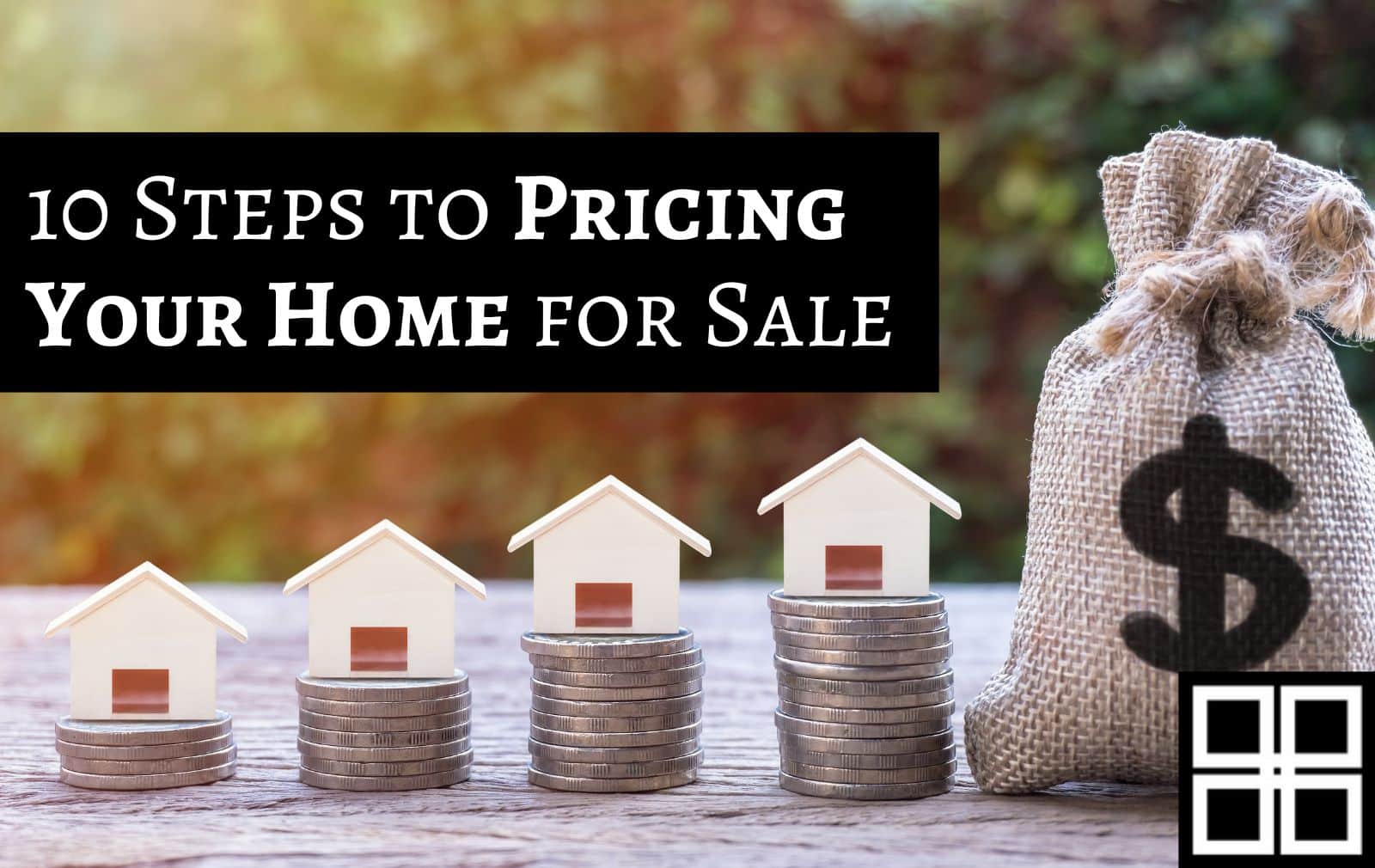10 Steps to Pricing Your Home
Deciding to sell your home is a big decision. And one of the first hurdles that come with this decision is to decide on a listing price. It can be difficult to know how to price your home. Working with an experienced real estate agent will give you a huge advantage. They have listed and sold many homes in your area, and that expertise is invaluable. If you’re one of the thousands of homeowners asking themselves, “How much should I sell my house for”, this guide will walk you through the process of choosing a listing price for your home.
1. Start by looking online
One of the easiest things to do when you want to know how much to list your home for is to look at the other houses currently listed for sale in your area. You can use any real estate website to search homes for sale. Then just focus on your neighborhood. It’s important to only look at houses in your immediate area since location is one of the biggest factors when it comes to home value.
Next, make sure that you are being honest with yourself when it comes to assessing the condition of your home. If your house needs several repairs or is outdated, you can’t compare it to a newly renovated home. Of course, if you plan to do certain upgrades before listing your home for sale, then you can take that into consideration as well.
Click here if you want to get your home’s value with just a few simple steps.
2. Look at comps in your area
What is a Comparative Market Analysis?
Once you hire a real estate agent, they will likely perform a Comparative Market Analysis (CMA). It’s a compilation of sales in your area. The CMA takes into account home details, the number of days that a house has been on the market and its final sale price.
You can do some research on the internet to get an idea of how much your house is worth. Don’t hesitate to ask a few agents for a CMA. These agents are used to giving comparables to prospective clients and may not need to visit your home. Consider hiring an independent appraiser. They can provide you with a fair value of your home for a few hundred bucks.
When you search for comparable properties on your own, make sure to note:
- You should be within a quarter to a half mile of your home.
- Lists within the past 3 months.
- Your property should be roughly the same age as yours.
- Square footage should be within 10% of yours. If your home has 1,500 square feet, then you should be looking at homes that are between 1,350 to 1,650 square feet.
3. You can learn from other sellers’ mistakes
Compare the original list prices of recently sold homes with their final sale prices to get an idea on how to price your home for sale. After all, the listing price is not what’s actually important when looking at other properties. It’s the sales price that matters. If it took many price reductions to make a sale, maybe it was priced too high to begin with. Don’t make that same seller mistake.
4. Don’t get stuck in a price band
Have you heard of price bands? This is the process of looking at current inventory and finding a lower price point in your area. As home sellers compete to price their houses, prices tend to pile up. If there are four houses in your area priced between $274,000-$276,000 and the next group of homes starts at $290,000. You should then take advantage of this wide price band and list around $280,000.
5. Century pricing and obscure numbers
It’s been proven that buyers are more likely to buy items priced under a “century number” (a nice round number). For example, $9.95 is better than $10, $19.99 is better than $20, etc. So your $299,000 house might appear more affordable than if you priced it at $300,000. However, pricing a home at an obscure and random number (such as $123,456) can be distracting for buyers and give a negative impression about you, the seller. In my opinion, the price you list your home at should not be affected by such things.
6. Search ranges for price
On popular real estate websites, you can find out the price range in which your home falls. Most buyers are aware of the price ranges they can afford or consider. If your home is listed at $305,000, a buyer searching for homes between $280,000 and $300,000 will not likely see it. If you list your home at $299,000 it will appear in the search results and could be a buyer. Now if the buyer is searching $300,000 to $350,000, it would not. So, in this case, listing the home at $300,000 has the advantage of showing up in both of the searches.
7. Pretend you are the buyer
When you’re going through the steps to selling your house, you must put your emotions aside. Check out what is being sold at the same price. Are these houses worth more or less than yours? Unfortunately, most homeowners cannot be objective when it comes to this question. That’s due to the emotional attachment they have to their home. My recommendation is to lean on your Realtor and trust their advice. This can help you keep emotions out of it.
8. Pricing for a bidding war
There’s a difference between “How much can I list my house for?” and “How much can I sell my house for?” This is especially true in a seller’s market where sellers are hoping for a bidding war that will drive up the final sale price.
This strategy may work but there is always the risk that the financing will not be approved, especially if the home does not appraise for the amount you offered. This can put lower offers at risk, and buyers may think that there is a problem with your house that caused the real estate deal to fall through.
Always consider all factors when negotiating an offer. It’s not just about the price.
9. Don’t be afraid to reduce the listing price
You may find that even after the most thorough research you have done, you still list your items too high. It’s not uncommon to see price reductions. It’s important to realize quickly when you have overpriced and then reduce the listing price, if necessary.
Avoid the temptation to make a few small price adjustments over time. Your goal is to sell your listing quickly, since older listings are not as appealing to buyers. Making one big price adjustment up front is almost always better than a bunch of small ones.
10. Second opinions are always welcome
Real estate agents know how to price properties and are on top of the local market. They can give you insight on how your house compares with other homes for sale in the area. If you are having difficulty determining the right price, it might be worth hiring an agent to help. The listing price is one of the things that your potential agents should give you when you are deciding on who to hire. This way, regardless of which agent you choose, you have had multiple recommendations. Now you can take all these into account when making your decision.
How to price your home in the current housing market
Keep in mind these factors when learning how to sell a house at the best price:
- Seasonality: Spring is the most popular time for selling a house in the United States. The weather is better and many families are looking to move before the summer vacation. The fall is second best, since most people have returned from their summer vacations. Winter is slow, not just because of the bad weather but also because everyone is busy with holiday preparations. The best time to sell will vary from city to city.
- Housing Inventory: We learned the basic principles of supply and demand in Economics 101. This is also true for real estate. You’ll struggle to get the price you want if your house is among 20 others for sale in your area. This is because supply will outweigh demand. If it’s a hot housing market, and there are only a few houses available in your neighborhood, you might be able to get the price you want, or higher.
- Buyer’s Market: In a buyers’ market, it is important to price your home slightly lower than other homes on the market. This is because there are many more houses for sale than there will be buyers.
- Seller’s Market: A seller’s marketplace is one where inventory is limited, and buyers are fighting for fewer houses.
- Neutral market: A neutral market is one where there’s a balance between buyers and homes available for sale. You’ll want to keep an eye out for comparables in the area to ensure your pricing is similar.
Listing price FAQs
Do homes sell at asking price?
It all depends on the market. In a sellers’ market, it is easier to sell your home at the asking price or higher. According to the National Association of Realtors, in 2021 the median home sale price was 100% of the listing price. It’s not unusual for homes to be sold at or below their asking price in a buyer’s market.
Can the seller change their list price?
A seller may change the price, if they don’t receive a good offer after a certain amount of time. They may lower the price of the house to encourage more offers if they’re eager to sell.
Although not common, a seller can also increase the price of their home after it has been listed. Sometimes, sellers will do this when an offer falls through. They republish it at a higher cost so that they have more room for negotiation.
Can I list my house for as much as I want?
If you do, you risk not receiving a reasonable offer for your house because you have overpriced it. To determine the best price, you must accurately evaluate your home, its location, current market conditions, and recent sales in your area. Consult your real estate agent throughout this process.
How can I find the list price?
If the home is listed online, a buyer can easily find out its list price. Ask your agent to provide you with the list price of any listings that meet your criteria.
You can determine the ideal price for your home by analyzing the market data provided by your agent. This analysis can help you decide the ideal dollar amount for your home based on its size, location and condition.












